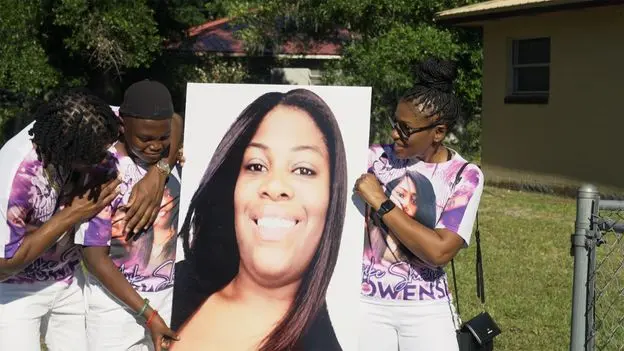- A new documentary, “The Perfect Neighbor,” uses police bodycam and CCTV footage to detail the fatal shooting of Ajike Owens, a Black mother of four, by her white neighbor, Susan Lorincz.
- The film, directed by Geeta Gandbhir, has been critically acclaimed for its innovative, narration-free approach, immersing viewers in the events leading up to the tragedy.
- Susan Lorincz was sentenced to 25 years for manslaughter after shooting Owens through a locked door, a case that drew international attention due to Florida’s controversial “Stand Your Ground” law.
- The documentary explores themes of racism and community conflict, using surveillance footage to humanize the victims rather than justify official actions.
A Neighborhood’s Nightmare Unfolds on Camera
A critically acclaimed Netflix documentary, “The Perfect Neighbor,” is commanding attention for its revolutionary use of police bodycam and CCTV footage to piece together the shocking killing of Ajike “AJ” Owens, a 35-year-old mother of four, by her neighbor in Florida. The film avoids traditional narration, instead immersing the audience in the raw, unfiltered reality of a community conflict that ended in a horrific tragedy.
The Fatal Encounter
The documentary reconstructs the events leading up to the night of June 2, 2023. Susan Lorincz, a 58-year-old white woman, had a history of confrontations with neighborhood children, including Owens’s. On that evening, after a dispute over an electronic tablet, Lorincz called the police. Just two minutes later, before officers arrived, Owens knocked on Lorincz’s door. In response, Lorincz fired a single shot through the locked metal door, killing the young mother.
Lorincz claimed she shot “in fear for my life,” but the film presents a pattern of escalating hostility. In one police call, she described herself as “the perfect neighbor,” yet community members and footage reveal a different story. Children referred to her as “the Karen” and reported that she used racial slurs, a fact Lorincz later admitted to police.
A Revolutionary Filmmaking Approach
Director Geeta Gandbhir sifted through approximately 30 hours of official footage—including doorbell cameras, police bodycams, and interrogation videos—to build the narrative. “Our mantra as a film team was really ‘show and not tell’,” Gandbhir explained. This fly-on-the-wall perspective captures the raw emotion of the aftermath, from Owens’s son screaming for someone to call 911 to the heartbreaking moment their father tells them their mother is never coming home.
Controversy and Justice
The case ignited a firestorm over Florida’s “Stand Your Ground” law, which allows for the use of deadly force in self-defense. This law was cited as the reason for a five-day delay in Lorincz’s arrest, drawing parallels to the 2012 killing of Trayvon Martin. Authorities stated they needed to rule out self-defense before making an arrest.
Pamela Dias, Ajike Owens’s mother, believes the film highlights systemic injustices. “Had the roles been reversed, I believe an arrest would have been made at once,” she said. “Susan was fuelled by hatred and racism, and the film unfolds all of that and even more.”
Ultimately, Lorincz was charged with manslaughter and sentenced to 25 years in prison. The sentencing judge noted that her actions were driven “more by anger than fear.”
Subverting the Narrative
Critics have lauded “The Perfect Neighbor” for its subversive use of law enforcement footage. As director Geeta Gandbhir noted, this type of footage is often used to justify official actions. “We wanted to flip that on its head,” she said. “I wanted to subvert that narrative with this film and use it differently instead to humanise this community.” The result is a visceral and haunting documentary that transforms a suburban street into what one critic called “a gaping, microcosmic wound of racism, paranoia, aggression, mental illness, and gun violence.”
Image Referance: https://www.bbc.com/culture/article/20251015-the-perfect-neighbor-the-cctv-film-that-captures-a-shocking-us-killing
